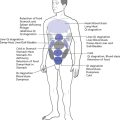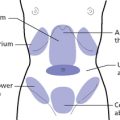 OBSERVATION OF THE FOUR LIMBS
OBSERVATION OF THE FOUR LIMBS
INTRODUCTION
The symptoms and signs relative to the four limbs are in Chapters 64, 65 and 66 of Part 5.
ATROPHY OF THE FOUR LIMBS
Interrogation, Chapter 39; Symptoms and Signs, Chapter 64
In children, atrophy of the four limbs is due either to a deficiency of Stomach and Spleen or to a congenital Kidney-Essence deficiency and it is one of the Five Flaccidities seen in children (see Ch. 90). The Chinese name for the condition that causes a child to have flaccid leg muscles and swollen knees is Crane Knee Wind, which is due to a deficiency of Yin of the three leg channels combined with invasion of Damp-Cold in the knees.
Box 18.1 summarizes the patterns underlying atrophy of the limbs.
FLACCIDITY OF THE FOUR LIMBS
Interrogation, Chapter 39; Symptoms and Signs, Chapter 64
Box 18.2 summarizes the patterns underlying flaccidity of the limbs.
RIGIDITY OF THE FOUR LIMBS
Symptoms and Signs, Chapter 64
Box 18.3 summarizes patterns underlying limb rigidity.
PARALYSIS OF THE FOUR LIMBS
Symptoms and Signs, Chapter 64
The main causes of paralysis of the four limbs are a Stomach and Spleen deficiency, a general deficiency of Qi and Blood and a deficiency of Yin of the Liver and Kidneys. There are also Full causes of paralysis such as retention of Dampness in the muscles and Blood stasis.
Box 18.4 summarizes the patterns underlying limb paralysis.
LIMB MOVEMENTS
Contraction of the four limbs
Symptoms and Signs, Chapter 64
In Empty conditions, the most common cause of contraction of the four limbs is Liver-Blood or Liver-Yin deficiency. In the elderly, a common example usually deriving from Liver-Blood or Liver-Yin deficiency is the Dupuytren contraction, which usually involves either the ring finger or the little finger (see Fig. 14.1 on p. 131).
Box 18.5 summarizes patterns underlying contraction of the four limbs.
Convulsions of the four limbs
Symptoms and Signs, Chapter 64
Epileptic attacks during pregnancy or after childbirth are generally due to Liver- and Kidney-Yin deficiency and Blood deficiency giving rise to Liver-Wind.
Box 18.6 summarizes patterns underlying convulsions of the limbs.
OEDEMA OF THE FOUR LIMBS
Observation, Chapter 19; Interrogation, Chapter 39; Symptoms and Signs, Chapters 64, 65, 68
Yang deficiency is the most common cause of oedema of the limbs: Lung-Yang deficiency affects primarily the hands, Kidney-Yang deficiency primarily the feet and Spleen-Yang deficiency both. Oedema of the four limbs may also derive from retention of Dampness in the muscles, which may be associated either with Cold or with Heat.
Box 18.8 summarizes the patterns underlying oedema of the limbs.




